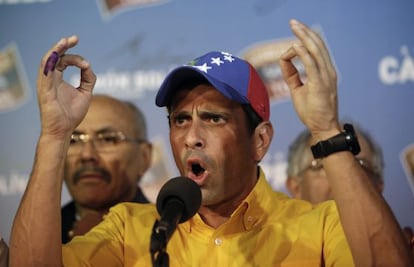Capriles, a presidential contender who knows how to wait
The former governor has defeated some of Chávez’s strongest candidates in past

Henrique Capriles knows how to lose. On the night of October 7, when he lost the election to President Hugo Chávez, by some 10 percentage points, he told his supporters: “It was me who didn’t win; the people shouldn’t feel defeated.”
But on Sunday night, Capriles said he wasn’t defeated. Venezuelan election officials announced that he narrowly lost the race by 1.59 percent to interim President Nicolás Maduro. Citing some 3,200 incidents of alleged voting violations, the former governor of Miranda state and Caracas native has demanded a ballot-by-ballot recount.
“Until then,” he said, Maduro will stay on as president. Those words resonated among Venezuelans the way another phrase – “for now” – stayed in the minds of the people when Chávez acknowledged in a live 1992 broadcast his defeat in the attempted coup he had spearheaded against then-President Carlos Andrés Pérez.
At only 40, Capriles has already run for president on two occasions. He was also twice elected governor of Miranda – the country’s most populous state which covers the wealthiest sectors of Caracas in the east, including Baruta where he also served as mayor.
In all his regional and local election victories, Capriles has successfully defeated some of Chávez’s strongest candidates, including Diosdado Cabello, the current National Assembly speaker, and Elías Jaua, the current foreign minister.
A law graduate of Andrés Bello Catholic University in 1994, Capriles embarked on his political career four years later when Chávez won his first presidential term. He was elected as deputy to the Social Christian Copei party, and at 26 he became the youngest speaker in the Chamber of Deputies when Venezuela still had a bicameral Congress.
One his first actions were to call for a corruption investigation into past congressional leaders – a sign that the bipartisan system which had governed Venezuela since democracy was restored in 1958 had lost credibility.
“At that time, they use to call Henrique a ‘light’ Chávez because he believed there was a need to restructure old institutions, and he took steps in that direction,“ recalled Rafael Guzmán, a former university classmate and member of his campaign committee.
In 2004 Capriles was arrested after he was charged of being one of the instigators of an attack on the Cuban Embassy in Caracas during the time Chávez was deposed from power for 48 hours in a failed coup attempt two years before. He served 40 days in prison until former US President Jimmy Carter intervened on his behalf.
Capriles is superstitious (he has worn the same shoes when he casts his ballot since 1998) and a practicing Catholic (each September he makes a pilgrimage to the island of Margarita to pay tribute to the patron, Virgin of the Valley).
“When he was in prison, a woman came and asked me if she could be alone with Henrique for 20 minutes. She had with her a statute of the Virgin of the Valley,” recalls his mother Mónica Radonski. “I never knew who the woman was, but that is why he is so devoted to the Virgin.”
Tu suscripción se está usando en otro dispositivo
¿Quieres añadir otro usuario a tu suscripción?
Si continúas leyendo en este dispositivo, no se podrá leer en el otro.
FlechaTu suscripción se está usando en otro dispositivo y solo puedes acceder a EL PAÍS desde un dispositivo a la vez.
Si quieres compartir tu cuenta, cambia tu suscripción a la modalidad Premium, así podrás añadir otro usuario. Cada uno accederá con su propia cuenta de email, lo que os permitirá personalizar vuestra experiencia en EL PAÍS.
¿Tienes una suscripción de empresa? Accede aquí para contratar más cuentas.
En el caso de no saber quién está usando tu cuenta, te recomendamos cambiar tu contraseña aquí.
Si decides continuar compartiendo tu cuenta, este mensaje se mostrará en tu dispositivo y en el de la otra persona que está usando tu cuenta de forma indefinida, afectando a tu experiencia de lectura. Puedes consultar aquí los términos y condiciones de la suscripción digital.









































